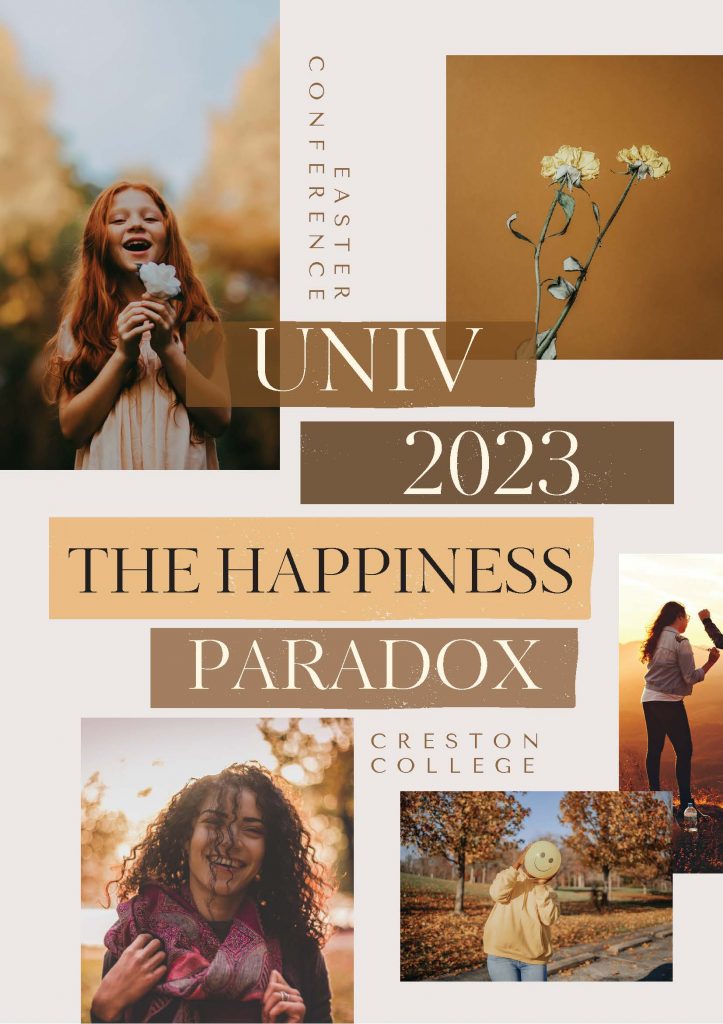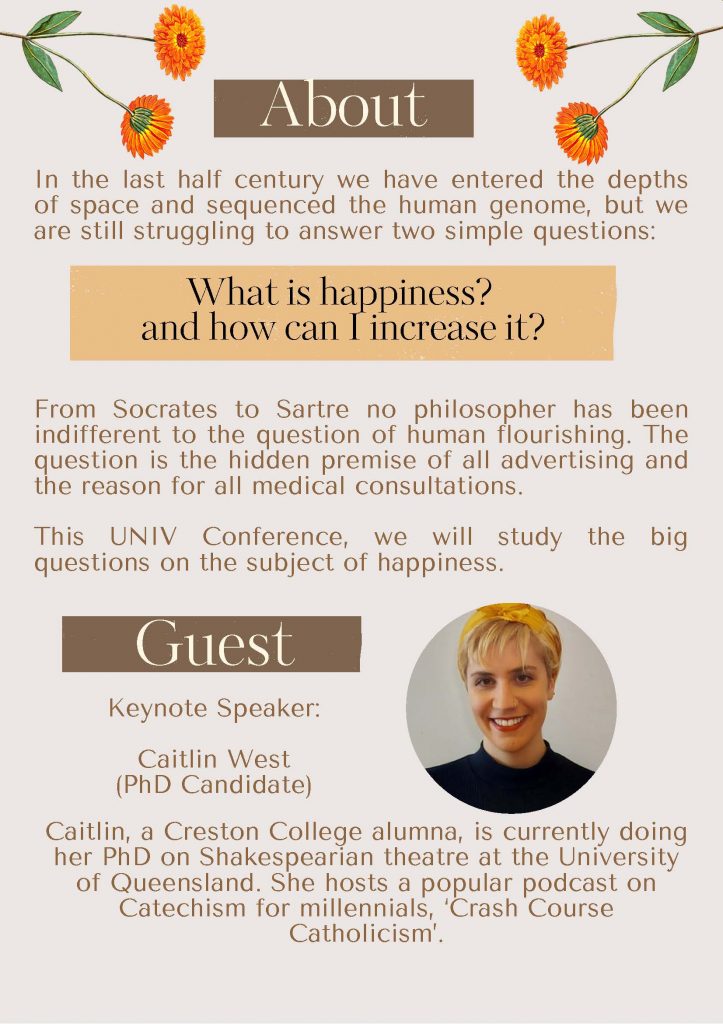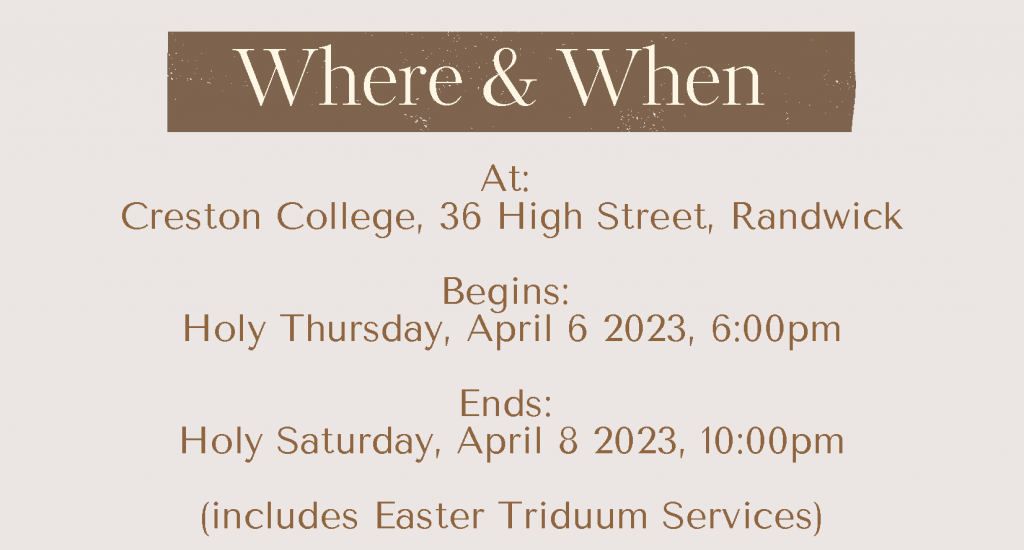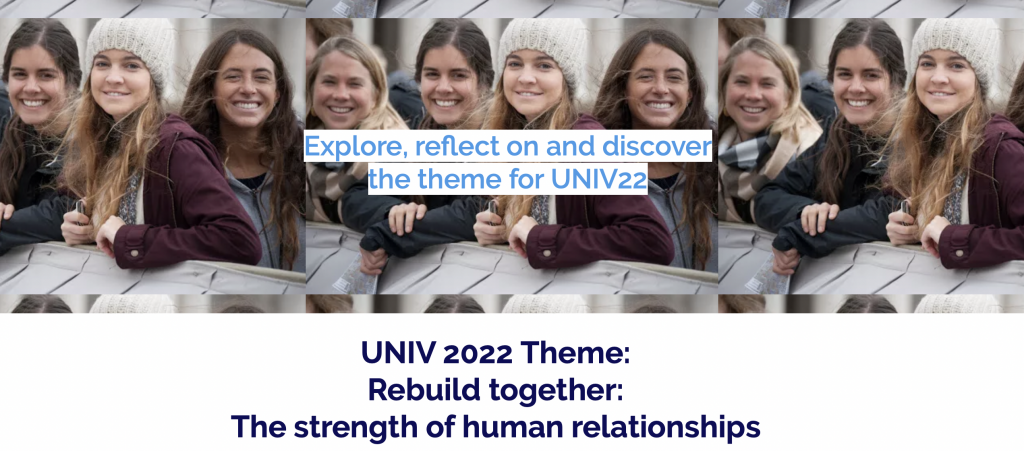REGISTER
Bringing university students and young professionals together to tackle world challenges.
Cost: $100 (includes meals and accommodation)


Bringing university students and young professionals together to tackle world challenges.
Cost: $100 (includes meals and accommodation)


Cost: $100 (bed Thurs & Fri; food Fri & Sat) – Pay through your GROUP LEADER



Cost: $100 (bed Thurs & Fri; food Fri & Sat)

For the past two years, we have lived through a great wave of change forced by the global pandemic. Looking back, at times we have felt alone, vulnerable, desperate, and disoriented.
We have been hit by humanitarian, economic, social, ecological and political crises and, despite everything, we have begun to awaken what really counts.
Pope Francis reminds us that we are all, “In the same boat, all fragile and disoriented, but at the same time important and necessary, all called to row together, all in need of mutual comfort.”
Faced with these difficulties, we are learning to rebuild on the basis of solidarity and hope. Our world asks us to move forward together in a new and truly human direction. This means stopping thinking and joining forces to seek sustainable and creative solutions that promote a culture of encounter.
UNIV22 will focus on how to rebuild together on the basis of solidarity and universal brotherhood.
Solicitor (NSW & ACT), Accredited Specialist, Personal Injury Law (Medical Negligence), PhD Candidate (UNDA), M. Bioethics (Harvard), LLM (res) (Syd), LLB (Hons), B Nurs (Hons)
Adjunct Associate Professor, School of Law, The University of Notre Dame Sydney
Anna Walsh is a lawyer specializing in Medical Law and Bioethics. An Accredited Specialist in Personal Injury law, she spent 10 years as a Principal in the Medical Law department of Maurice Blackburn Lawyers, where she acted for plaintiffs in a number of novel medical negligence cases as well as high profile inquests in the Coroner’s Court. She has published widely in Medical Law, is a regular speaker at conferences, and is an author for Lexis Nexis’ Practical Legal Guidance series. In 2011, she was named the Lawyer of the Year in Private Practice by the NSW Women Lawyers’ Association, and in 2018 was the winner of the 3MT competition at the University of Notre Dame Australia.
Anna is a PhD Candidate at the University of Notre Dame, completing a qualitative study on doctors and freedom of conscience. She teaches full time in the School of Law at University of Notre Dame in the subjects Advanced Torts, Mental Health Law, Remedies, Advocacy and Legal Research and Writing, and tutors in Bioethics in the School of Medicine. She is also an Adjunct Lecturer at the College of Law in Civil Litigation and Ethics, and practices as a private Legal Consultant. She has Honors degrees in Law and Nursing, a Master of Laws (res) from University of Sydney and a Master of Bioethics from Harvard Medical School.
(from The University of Notre Dame Sydney website)
Did you ever think about the fact that only humans have hands? It may seem obvious, but it’s not. In the world of nature, we humans are uniquely vulnerable: wings, paws or flippers get you around a lot faster and farther; fur and feathers provide protection from the elements; refined senses, instincts, and defense mechanisms automatically kick in to ward off dangers and detect opportunities for growth.
But our vulnerability is at the same time our strength.
With our hands, we can build wings to fly.
With our hands, we can design our own habitat and weave our own wear.
With our hands, we can provide care, establish relations, protect ourselves and others.
Our hands are instruments open to infinite possibilities.
With our hands, we humanize the world.
Our basic needs become arts and professions: Medicine, Gastronomy, Architecture, Fashion, Communication, Education, Domestic Work, Design;
Our interdependence creates employment opportunities: Commerce, Health Care, Politics, Law, Economy, Business, International Affairs;
Our openness to infinite possibilities drives work forward: Technology, Entertainment, Innovation, Research, Creativity.
With our hands, we work. But have we always worked in the same way? Today the world of work is undergoing arguably the most drastic transformation since the Industrial Revolution in the 19th Century. Information technology, shifting social demographics and globalization are some of the factors that are shaping the ambiguous future of work, in which one-track careers are being replaced by multi-faceted professional trajectories, and personal capacities and aptitudes such as critical thinking, resilience, problem-solving and decision-making are increasingly valued over technical know-how.
The world of work in the 21st century is full of challenges: vast geographic and social inequalities, corruption, inefficient structures, forced labor, unrecognized and uncompensated work, human trafficking, unregulated activity in emerging sectors and high levels of youth unemployment…
So let’s get down to business. The 21st century professional is serious, dedicated, diligent, creative, transformational, focused, capable of persevering in an integrated cognitive and physical effort. What kind of personal development does a professional in today’s workforce need in order to convert needs into opportunities and vulnerabilities into strengths? How does one´s profession become an authentic service to society and the individuals who surround us? What can your hands do that a robotic arm cannot? What can you contribute that lies beyond the scope of artificial intelligence? The challenges are many… but our hands are open to infinite possibilities